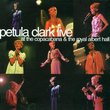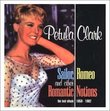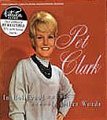A Warners Hit & Miss Combine in One Outstanding CD
Thomas C. Rizzo, Jr. | Largo, Florida | 06/25/2001
(5 out of 5 stars)
"With the original release of "Just Pet" in 1969, Petula Clark took yet another step away from the brassy-beat arrangements of her long-time collaborator (and "Downtown" composer) Tony Hatch, working for the most part with friend Michel Colombier, whose devotion to full, lush orchestrations is evident in his often overwhelming contributions here. "Fill the World With Love" was the Brookfield school anthem in Clark's at-the-time forthcoming film "Good-bye, Mr. Chips", and here Colombier jazzed it up, adding the Jimmy Joyce Singers and the Boys Chorus as background for a rousing rendition. Clive Westlake's "No One Better Than You" was the track selected for the first (and only) single release, but it barely registered in the charts, perhaps marred by a calliope-sounding accommpaniment and over-abundance of background vocals. Better-arranged and sung were his compositions "Houses" and "Butterfly", in addition to the Turtles' hit "Happy Together". The highlights of this collection, however, are the two Beatles songs arranged by Clark's long-time associate Frank Owens - "Hey, Jude" and "The Fool on the Hill", which was to become the show-stopper of Clark's nightclub act and concert program for a number of years. The "miss" in this compilation is "Petula 71", which was assigned a catalogue number by Warners but never released by the label, as during the course of negotiations involving its production values Clark's contract came up for renewal, and Warners, unhappy with the "sound" of "Petula 71", opted not to renew her . . . thus "missing" out. The "Petula 71" tracks presented here are those of the U.K. release; when originally formatted on CD back in 1996, Sequel (parent of the issuing label "rpm") included previously unreleased re-recorded versions of several of the tracks that had been unearthed after all these years. They were intended for the U.S. release, and the "sound" of those second versions is indeed dramatically different - and often better - than those that were on the U.K. LP. Without those here for comparison, however, "Petula 71" remains an example of some of Clark's most oustanding work after fading from the U.S. charts. Working with producer and arranger Johnny Harris (who also co-wrote five of the tracks), and recording material more mature than her mid-60s pop efforts, Clark's voice is rich and clear, her enunciation more precise than ever. She lets lyrics swirl about in her head and emerge slowly, daring to make a 4-letter word sound as if it's eight syllables long as it darts along the musical chart you can practically see with each note she sings. "Tears of a Clown" is almost out-of-place here, its Motown-tinged beat and rhythms unlike any of the other tracks, but it affords Clark the opportunity to take an old hit and turn it into her very own. (Her treatment of "For All We Know' and "If" revitalize those standards, as well.) "He Made Me Woman", "I Know What Love is About", and "Looking at Life" could be considered part of a song-cycle from a woman's life. And the woman, using her voice as an integral part of the instrumental bridge mid-song, soars in "Wind of Change". Add another long-time showstopping-number from her concert tours - "I Don't Know How to Love Him" - and you have a nearly-perfect sampling of the post-"Downtown" sound of Petula Clark."
Experimental albums show Petula in fine form
Peter Durward Harris | Leicester England | 09/06/2002
(5 out of 5 stars)
"Although different from other Petula albums, the Petula stamp of quality is still recognisable. After splitting with Tony Hatch, Petuala tried various different producers, each giving a different overall sound to the album they produced.The first album (Just Pet), on which Petula collaborated with Michel Colombier, while sounding different (sometimes with a harder edge) from what went before, includes the usual mix of famous and obscure songs.The two Beatles covers (Hey Jude and Fool on the hill) are brilliant, qhile there are also great covers of Happy together (Turtles) and If I only had time. The album did not yield any major hits - one single (No one better than you) was released, but flopped. It's brilliant, but perhaps it wasn't what radio stations and record buyers were looking for at the time.The second album (Petula 71) is very different, with lush orchestrations arranged by Johnny Harris. This was not released in America at the time, because Warner didn't like the sound of it, but it's a great album. Perhaps it wasn't right for America in 1971, but it contains another great mix of songs.The covers include Tears of a clown (Smokey Robinson and the Miracles), For all we know (Carpenters) and If (Bread).The bonus track is I don't know how to love him, which Petula recorded first. Because it was not released immediately as a single, it had to compete with Helen Reddy's cover when it was eventually released.This is a fascinating collection of Petula's experimental period. Although she never again recaptured the success of the Hatch years, this collection is still worth a listen."




